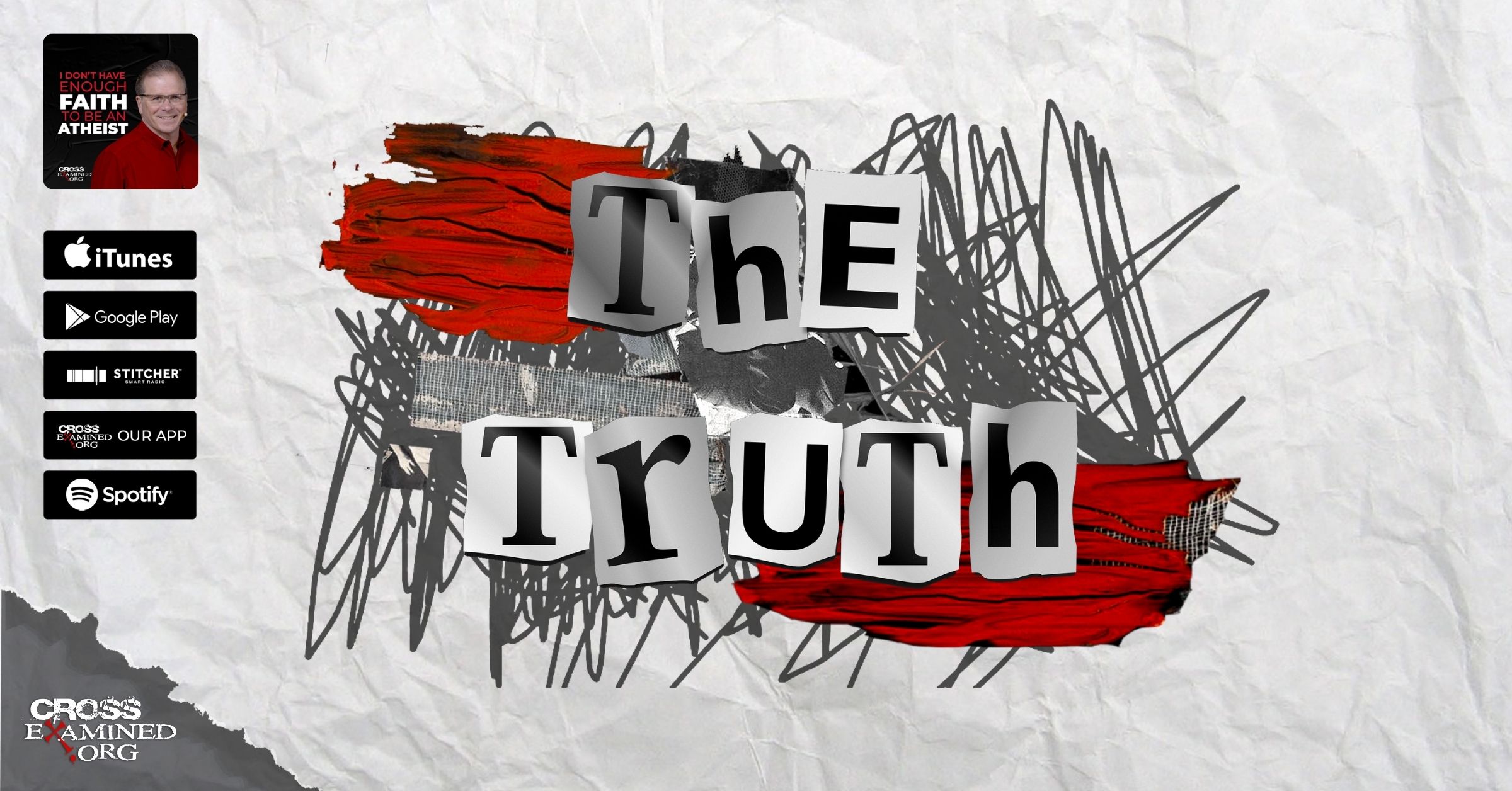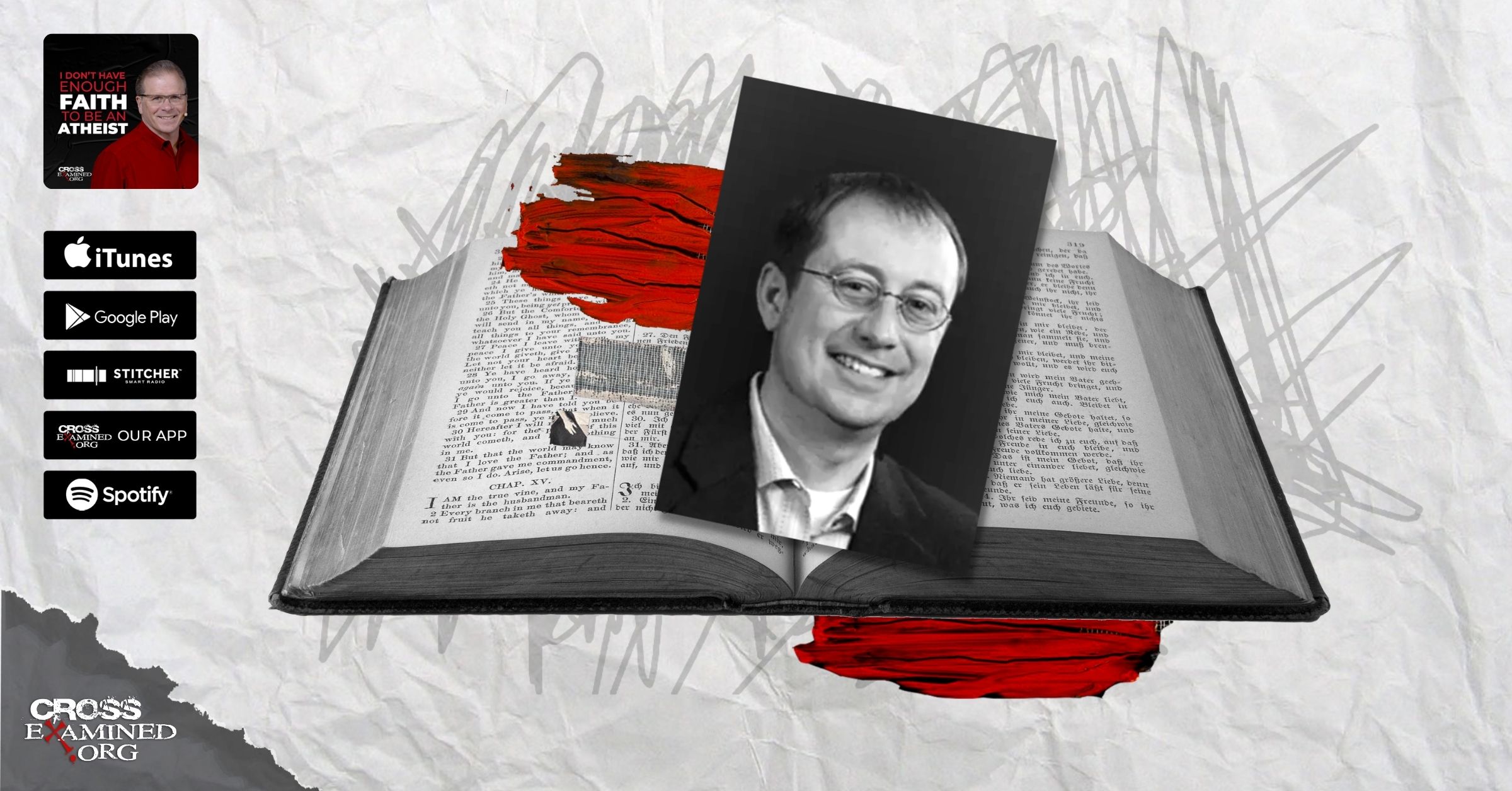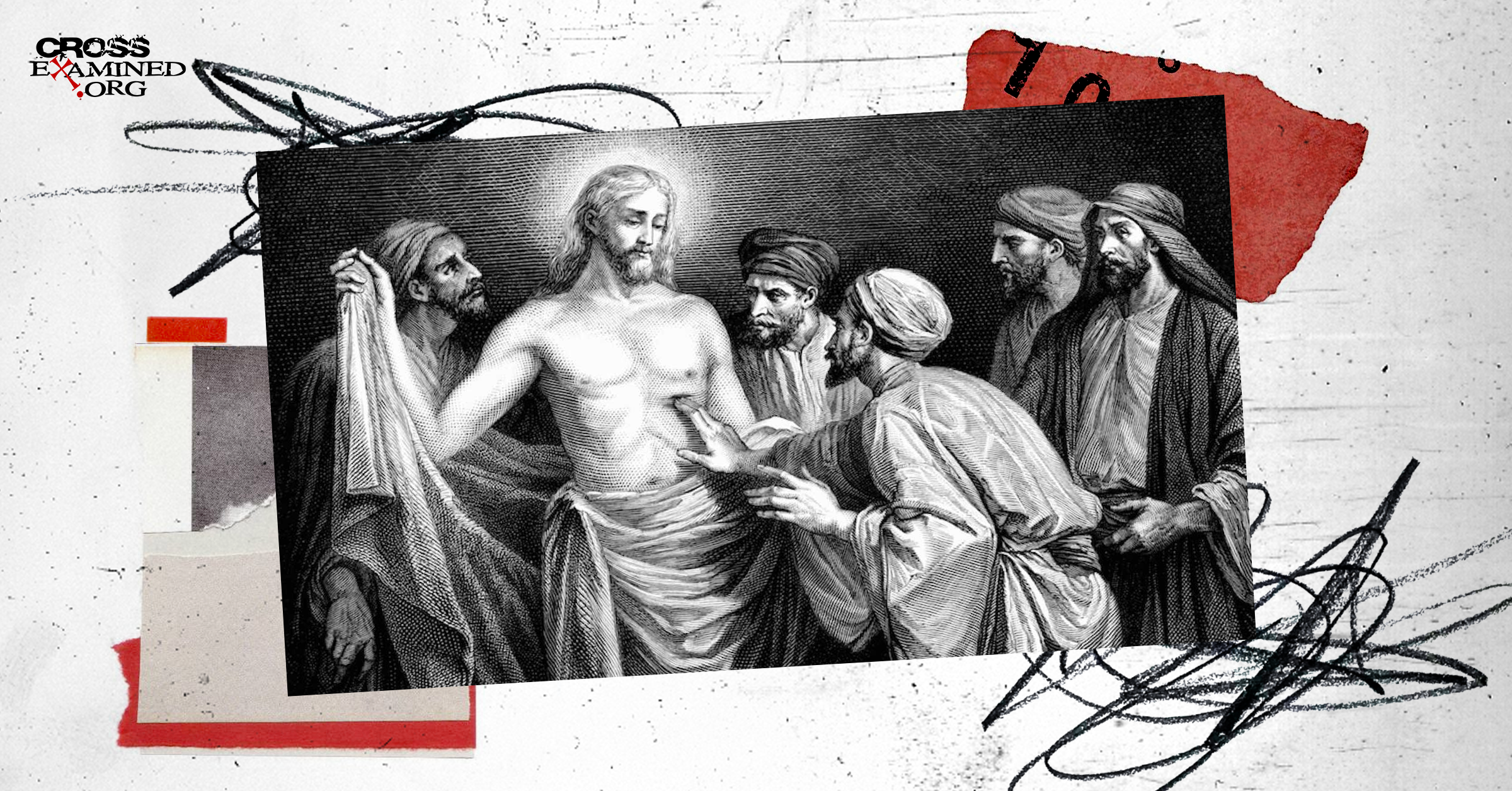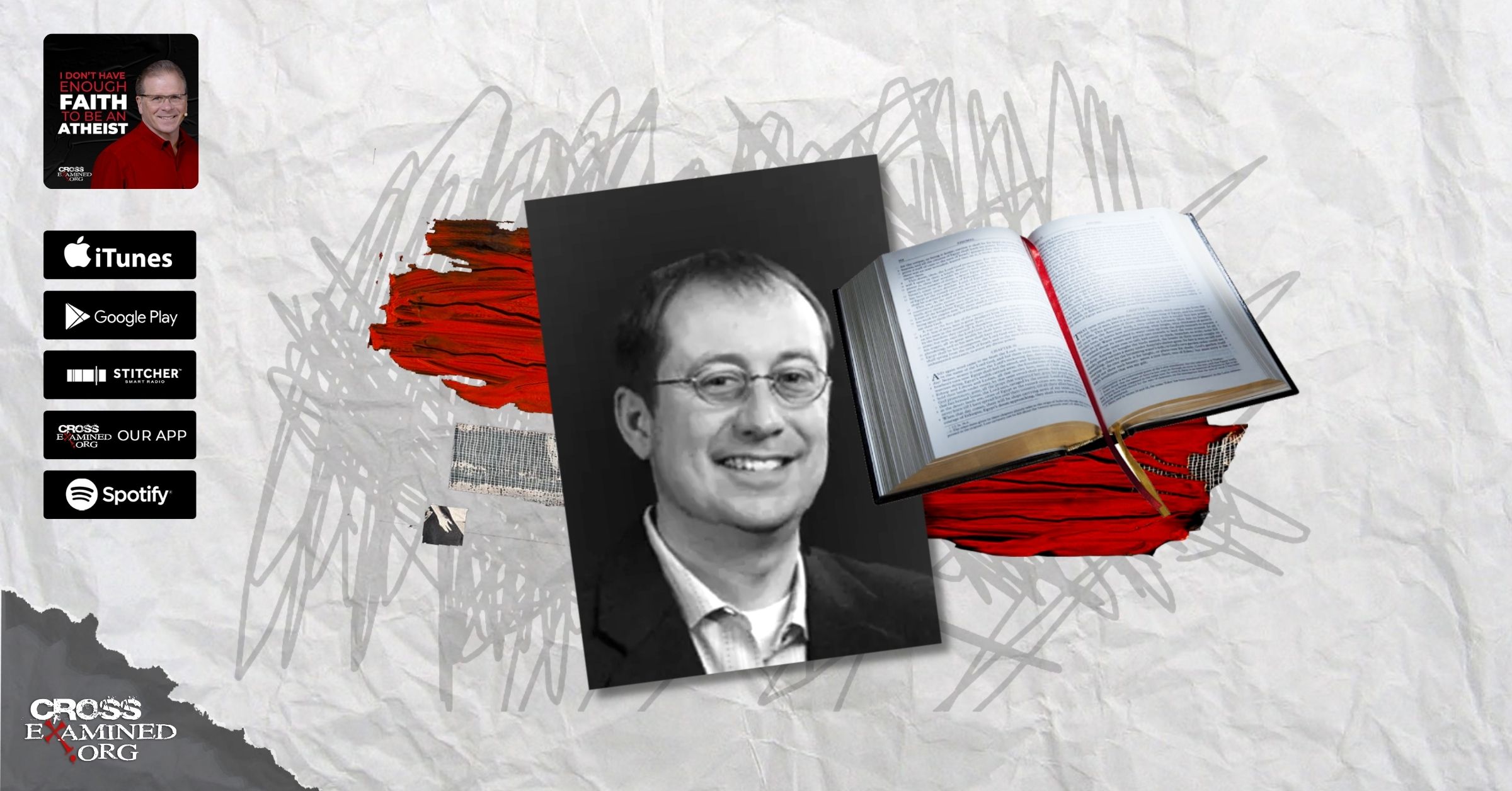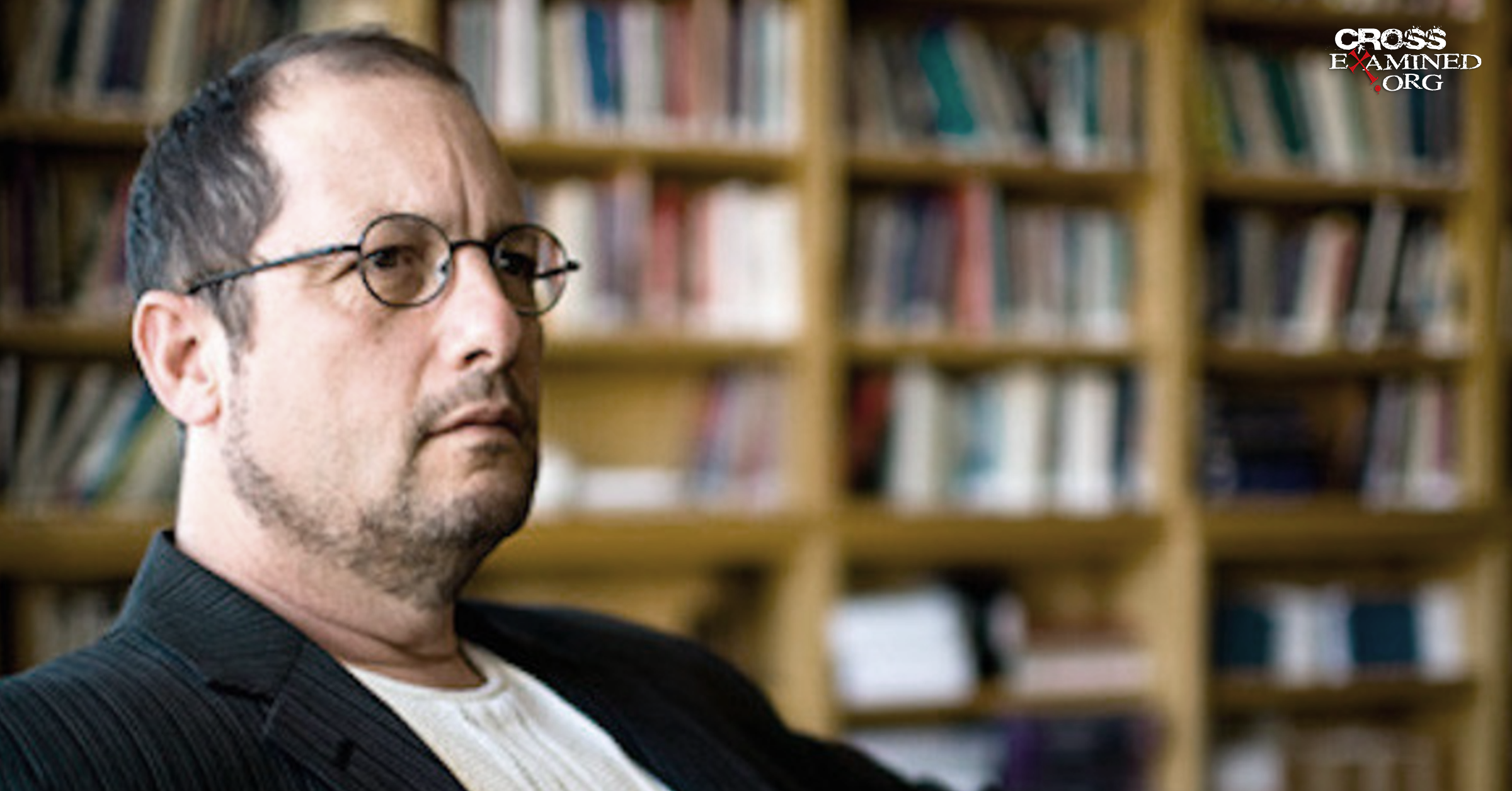Nearly a year ago, I published a series of three articles in which I reviewed sections of Bart Ehrman’s book Jesus, Interrupted: Revealing the Hidden Contradictions in the Bible (And Why We Don’t Know About Them). If you have not read those articles already, you can find them at the links below:
Why You Should Not Be Intimidated by Bart Ehrman: A Review of Jesus, Interrupted (Part 1)
More Misrepresentations and Distortions by Bart Ehrman: A Review of Jesus, Interrupted (Part 2)
Finding Contradictions Where There Is None: A Review of Jesus, Interrupted (Part 3)
Bart Ehrman was recently interviewed on the atheist MythVision podcast about alleged contradictions in the New Testament. During the course of the discussion, the host Derek Lambert asked Ehrman to comment on my critiques of Jesus, Interrupted (see this time stamp). This is my response to Ehrman’s remarks.
Before I begin my response to Ehrman’s interaction with my comments, I wish to clarify my methodology, since Ehrman misrepresented my views a number of times during the podcast. Indeed, despite confessing to having no prior knowledge of my work, Ehrman apparently felt at liberty to impute to me certain views that I do not in fact hold. In particular, Ehrman insinuated on multiple occasions that I am an inerrantist and a fundamentalist, whereas in reality I am neither an inerrantist, nor a fundamentalist (at least in the sense in which the word is used in popular parlance). I do not believe that it is proper practice to exclude a priori the possibility that the authors of the gospels have made a mistake or that there exists an actual discrepancy between the accounts (see, for instance, this article for a small handful of examples, albeit non-exhaustive, where I think the best explanation is that a gospel author has made a good faith error). Thus, it is not that I think there can be no errors between the gospel accounts. Rather, it is that I do not believe that the vast majority of the examples Ehrman adduces in Jesus, Interrupted are best explained as an actual contradiction, though I remain open to persuasion in principle. With that clarified, I now turn to those examples touched on in Ehrman’s recent interview on the MythVision podcast.
Matthew’s Dual Donkeys
In Jesus, Interrupted, Bart Ehrman makes the popular claim that Matthew has Jesus riding into Jerusalem seated upon two animals. He states on page 50,
In Matthew, Jesus’ disciples procure two animals for him, a donkey and a colt; they spread their garments over the two of them, and Jesus rode into town straddling them both (Matthew 21:7). It’s an odd image, but Matthew made Jesus fulfil the prophecy of Scripture quite literally.
I pointed out in my previous article that this is not the only way to interpret Matthew’s words, and there is in fact a much more charitable interpretation. Here is the text from Matthew 21:7:
They brought the donkey and the colt and put on them their cloaks, and he sat on them.
What is the antecedent of “them”? The most plausible antecedent is the cloaks. Matthew is indicating that Jesus sat on the cloaks, not that he sat on both the donkey and the colt.
Bart Ehrman responds by pointing out that the cloaks, according to Matthew, are placed on both animals — that is, both the donkey and the colt. Thus, Ehrman argues, we should understand Jesus to be seated on all of the garments, which are spread across the two animals. However, this is a very uncharitable reading of Matthew. Are we really to think that Matthew envisioned Jesus riding on two animals of different heights like some rodeo showman? If that is really what Matthew meant, surely he would have made himself more explicit, since I doubt that it is the interpretation that Matthew’s original readers would have taken from this verse. It did not even cross my mind until I started reading critical literature on the gospels, despite having read Matthew for years. While the cloaks were placed on the two animals and Jesus is said to have sat on the cloaks, it does not follow that Jesus sat on all of the cloaks. Perhaps there were multiple cloaks on one animal and one cloak on the other.
Furthermore, Ehrman’s interpretation depends on the premise that Matthew misunderstood the Hebrew parallelism, erroneously concluding that Zechariah envisioned two animals instead of just one (Zech 9:9). However, Matthew appears to have been quite conversant in Hebrew. For example, consider this text from Matthew 8:16-17:
16 That evening they brought to him many who were oppressed by demons, and he cast out the spirits with a word and healed all who were sick. 17 This was to fulfill what was spoken by the prophet Isaiah: “He took our illnesses and bore our diseases.”
Verse 17 quotes from Isaiah 53:4. It is of note that Matthew does not here quote from the Septuagint, which reads, “He himself bore our sins and was pained because of them.” Matthew’s quotation does not even match the Aramaic Targum, which reads, “Then for our sins he will pray and our iniquities will be forgiven because of him.” Instead, Matthew translates the Hebrew quite literally, highlighting how it is fulfilled in Jesus performing miracles of healing. Matthew’s acquaintance with Hebrew thus make it quite unlikely that he would so grossly misunderstand the parallelism in Zechariah.
In my previous article, I had also pointed out that, since the colt never had been ridden, or even sat upon (as stated by Mark and Luke), its dependence upon its mother is very understandable (as implied by Matthew). The host of the podcast, Derek Lambert, represented this remark as asserting that the colt required some kind of “moral support” from its mother (though this phrase was not used by me). Ehrman ridiculed this idea as though it were something ludicrous. But this has in fact been suggested by many scholars who have written on this text. For example, Richard Thomas France, in his commentary on Matthew, writes[1],
Garments serve as improvised saddle-cloths, placed on both animals, but there is no need to understand thereon (literally ‘on top of them’, where ‘them’ could refer as well to the garments as to the donkeys) as meaning that Jesus rode on both animals in turn. The mother was brought to help to control the colt as Jesus rode on it, and both animals were therefore decked appropriately for the festive occasion.
Craig Keener likewise states that “Colts that had not yet been ridden sometimes accompanied their mothers.”[2]
When was the Temple Curtain Torn?
On page 51-52 of Jesus, Interrupted, Ehrman discusses the ripping of the temple curtain, which happened as Jesus died. Ehrman writes,
According to Mark’s Gospel, after Jesus breathes his last, the curtain of the Temple is torn in half (15:38)…Luke’s Gospel also indicates that the curtain in the Temple was ripped in half. Oddly enough, it does not rip after Jesus dies but is explicitly said to rip while Jesus is still alive and hanging on the cross (23:45-46).
In my previous review of Ehrman’s arguments, I had pointed out that the Greek conjunction και is temporally non-specific. Although often translated “then” in our English Bibles, a more precise translation would be “and.” It does not necessarily imply that one event happened subsequent to the other.
In response, Ehrman challenged me to produce three examples in Luke’s passion narrative where Luke narrates a sequence of events and uses και but the second event takes place prior to the first. It appears though that Ehrman has misunderstood my argument. I am not saying that Luke intends his readers to understand that the ripping of the temple veil took place after Jesus’ last breath (or that Mark intends his readers to understand that it took place before Jesus’ last breath). Rather, as I noted in my review, the text in both Mark and Luke is consistent with Jesus’ death taking place simultaneously with the ripping of the temple curtain. Could Mark and Luke have been more explicit if that is what they meant? Yes, they could. However, it is quite plausible that Mark and Luke simply did not know the precise sequence of events, knowing only that Jesus had died and that the temple curtain had been observed to have been torn in two, and so they left the precise sequence of events ambiguous.
Jesus’ Miracles in John
The next example Ehrman addresses is my interaction with this alleged discrepancy internal to John’s gospel, which Ehrman discusses on page 8 of Jesus, Interrupted:
Not only are there discrepancies among different books of the Bible, but there are also inconsistencies within some of the books, a problem that historical critics have long ascribed to the fact that Gospel writers used different sources for their accounts, and sometimes these sources, when spliced together, stood at odds with one another. It’s amazing how internal problems like these, if you’re not alerted to them, are so easily passed by when you read the Gospels, but how when someone points them out they seem so obvious. Students often ask me, “Why didn’t I see this before?” For example, in John’s Gospel, Jesus performs his first miracle in chapter 2, when he turns the water into wine (a favorite miracle story on college campuses), and we’re told that “this was the first sign that Jesus did” (John 2:11). Later in that chapter we’re told that Jesus did “many signs” in Jerusalem (John 2:23). And then, in chapter 4, he heals the son of a centurion, and the author says, “This was the second sign that Jesus did” (John 4:54). Huh? One sign, many signs, and then the second sign?
In my previous review of this argument, I pointed out that this objection quickly dissolves upon a closer inspection of the context of these verses. Here are the full verses with the relevant portions highlighted in bold font:
- John 2:11– “This, the first of his signs, Jesus did at Cana in Galilee.”
- John 2:23– “Now when he was in Jerusalem at the Passover Feast, many believed in his name when they saw the signs that he was doing.”
- John 4:54– “This was now the second sign that Jesus did when he had come from Judea to Galilee.”
As can be seen from the above, the first and second signs relate to Jesus’ miracles in Galilee. The many signs between the first and second Galilean signs are performed in Jerusalem.
Ehrman responds by pointing out that whether John contradicts himself depends on how one translates John 4:54. Ehrman proposes that we translate John 4:54 as saying “This is the second sign Jesus did. He did this sign after He came from Cana to Galilee.” Is Ehrman’s proposal a possible interpretation? Yes, it is. But why opt for one possible interpretation over another when the former puts an author into conflict with himself? This is not a charitable way to read literature.
The word ἐλθὼν in John 4:54 is an aorist participle, and I would probably be inclined to translate this verse something along the lines of “Having come from Judea to Galilee, this is the second sign that Jesus did.” However, this translation is quite consistent with my interpretation, namely, that this is the second sign that Jesus performed during his ministry to Galilee. Again, if we have an ambiguous text, the charitable reading is that which comports with what the same author has said elsewhere, not that which puts the author into conflict with his own explicit statements elsewhere.
How Many Women Went to the Tomb?
The next example addressed by Ehrman concerns the identity of the women who visited the tomb on Easter morning. Here is the original quote (p. 48):
Who actually went to the tomb? Was it Mary alone (John 20:1)? Mary and another Mary (Matthew 28:1)? Mary Magdalene, Mary the mother of James, and Salome (Mark 16:1)? Or women who had accompanied Jesus from Galilee to Jerusalem – possibly Mary Magdalene, Joanna, Mary the mother of James, and “other women” (Luke 24:1; see 23:55)?
According to Bart Ehrman, John 20:1 indicates that it was Mary alone who went to the tomb. However, as I pointed out in my earlier article, in verse 2, we read,
So she ran and went to Simon Peter and the other disciple, the one whom Jesus loved, and said to them, “They have taken the Lord out of the tomb, and we do not know (οὐκ οἴδαμεν) where they have laid him.”
The word οἴδαμεν is the first person plural form of οιδα, meaning “to know,” and the word οὐ / οὐκ is an adverb that negates the verb, hence “we do not know.” Thus, Mary’s use of the plural in this verse implies that there were in fact other women who had been present with Mary at the tomb.
Ehrman responds to this observation by noting that my solution does not in fact reconcile the texts, since Matthew, Mark, and Luke do not all say the same thing either. However, Luke indicates explicitly that he has not given us an exhaustive list of the women who were present at the tomb on Easter morning. Luke 24:10 indicates,
Now it was Mary Magdalene and Joanna and Mary the mother of James and the other women with them who told these things to the apostles.
Given that Luke indicates explicitly that his list is not exhaustive, it is very difficult to see how Ehrman can allege a contradiction in regards to which women were present at the tomb.
Ehrman asks why John does not tell the reader who the other women were? However, it is not at all clear to me why it would have been necessary for John to do so. John spotlights Mary Magdalene because she is the one who ran to inform Peter and the disciple whom Jesus loved (very probably the apostle John) about the fact that the body of Jesus was missing. If the fourth gospel is indeed written by John the son of Zebedee (as I maintain), then it would be natural for him to spotlight Mary Magdalene in this role since he was one of the two disciples that Mary Magdalene spoke to following her discovery of the empty tomb.
Ehrman further asks that if one only read through the end of verse 1 of John 20, what would one think had happened so far? Obviously, one would surmise that Mary Magdalene had gone to the tomb. Ehrman’s point here is unclear, however, since John does not stop at verse 1 but includes verse 2 as well. Even if John had not included the subtle allusion to other women in verse 2, it is difficult to see how John contradicts the other gospels since nothing prevents John from spotlighting Mary Magdalene while omitting to mention the other women with her, in particular in view of her role in reporting to Peter and John what she had seen.
Ehrman also argues that an alternative interpretation of the saying “we do not know where they have laid him” is that she had left the tomb and conferred with other people, who likewise did not know where Jesus’ body had been taken. Ehrman objects, “If you want to play that game, you could play it either direction. So, how do we know what one is right?” But this is not how history ought to be done. The reality is that we have not just one biography of Jesus’ life but four biographies, all of which may be shown to be written by individuals who are close up to the facts, well informed, and habitually reliable (see my other articles pertaining to this topic for a detailed discussion of the evidence for this). That being the case, it is legitimate scholarly practice to allow those sources to illuminate and clarify one another, since they are written from multiple perspectives and, although there is evidently a significant level of literary dependence between them (especially the synoptic gospels), there is also information that the authors appear to have independent access to. In the case of interpreting John 20:2, the hypothesis that the others implied in Mary’s statement are the other women at the tomb has a higher prior probability than Ehrman’s proposed interpretation, since we have independent evidence for that scenario, whereas we do not have independent evidence supporting Ehrman’s proposal. Therefore, the interpretation that I offered ought to be the one preferred.
It is also noteworthy that Matthew and Mark appear to be independent of Luke when it comes to the women’s discovery of the empty tomb, as Lydia McGrew has observed.[3] Luke indicates in Luke 8:1-3 that some women followed Jesus from Galilee, including Joanna, the wife of Chuza, Herod’s household manager. This detail is confirmed by an undesigned coincidence with Matthew 14:1, since it illuminates how the author of Matthew’s gospel might know what Herod had said to his servants, presumably in the privacy of his palace. The names given in Luke’s list are Mary, Joanna, and Susanna, as well as “many others,” (Lk 8:2-3). Mark, describing the women who were “looking on from a distance” at the crucifixion, lists “Mary Magdalene, and Mary the mother of James the younger and of Joses, and Salome,” (Mk 14:40). These names overlap only partially with those given in Luke 8. There is no mention in Mark of Joanna or Susanna, and Luke does not mention Mary the mother of James or Salome. It does not appear that Luke added the passage in chapter 8 in order to “put” the women in place earlier in Jesus’ ministry and thus fit his narrative together with Matthew and Mark concerning the women at the cross because the names are only partially the same. Luke would have presumably included Mary the mother of James, and Salome, and probably left out Susanna if he had fictionalized the verses in chapter 8 on the basis of Mark’s mention of the women at the cross. Luke himself mentions the women who came from Galilee at the cross and burial (23:49, 55) but does not even name any of them there. Both accounts, therefore, confirm apparently independently that there was a group of women who had begun following Jesus in Galilee and who continued to do so and who helped Jesus in concrete ways (“ministering” or “providing”).
In Luke 24:6-10, the angels tell the women at the empty tomb, “Remember how he told you, while he was still in Galilee (v. 6).” This makes it clear that these women really were personally with Jesus in Galilee and heard what He said there. When Luke names various women who brought the disciples news of the empty tomb and the message of the angel (24:10), he names Mary Magdalene, Mary the mother of James, and Joanna (and says there were other women as well). Once again, he does not seem to be trying to reproduce his own list from chapter 8, for Mary the mother of James was not in that list, and Susanna isn’t mentioned in 24:10. Nor is he reproducing Mark’s list of women at the cross nor Mark’s list of women who came to the tomb (Mk 16:1), since Salome isn’t included in Luke’s list, and Joanna (who is unique to Luke) is not included in Mark’s list. Luke seems to be listing women whom he really knows were present for the events on Easter morning. Evidently, he is not sure about Susanna’s presence or just does not bother to mention her, and he knows that Mary the mother of James was there on Easter morning even though she is not listed in his chapter 8.
Thus, distant parts of Luke’s own narrative fit together in an apparently casual and non-deliberate way — Mary Magdalene, Joanna, and various other women were with Jesus in Galilee and heard there Jesus’ own prediction concerning His crucifixion and resurrection. They therefore subsequently went with him to Jerusalem and were present for the events of the cross, burial, and empty tomb.
Where was Jesus the Day After His Baptism?
On pages 40 and 41 of Jesus, Interrupted, Bart Ehrman, asks where was Jesus the day after he was baptized? He writes,
In Matthew, Mark, and Luke – the so-called Synoptic Gospels – Jesus, after his baptism, goes off into the wilderness where he will be tempted by the Devil. Mark especially is quite clear about the matter, for he states, after telling of the baptism, that Jesus left “immediately” for the wilderness. What about John? In John there is no account of Jesus being tempted by the Devil in the wilderness. The day after John the Baptist has borne witness to the Spirit descending on Jesus as a dove at baptism (John 1:29-34), he sees Jesus again and declares him to be the Lamb of God (John is explicit, stating that this occurred “the next day”). Jesus then starts gathering his disciples around him (1:35-52) and launches into his public ministry by performing his miracle of turning water into wine. So where was Jesus the next day? It depends on which Gospel you read.
As I pointed out previously, John does not narrate the baptism of Jesus by John the Baptist in the Jordan. Rather, John merely says,
And John bore witness, “I saw the Spirit descend from heaven like a dove, and it remained on him. I myself did not know him, but he who sent me to baptize with water said to me, “He on whom you see the Spirit descend and remain, this is he who baptizes with the Holy Spirit.” And I have seen and have borne witness that this is the Son of God.
This, then, is not the baptism narrative itself but rather John giving testimony to what had happened on an earlier occasion.
In response to my comments, Ehrman points out that you have to start with John 1:29 where the passage begins. It begins with the phrase “on the next day.” Ehrman notes that the next day is in relationship to the day when John the Baptist was speaking (v. 23). It must therefore be taken to be narrating a sequence of events. There is no disagreement there. However, Ehrman appears to have once again misunderstood the argument. I am not contesting that the “next day” of verse 29 stands in relationship to the day when John the Baptist was speaking. Rather, my point is that it is not at all necessary to take verse 23 as pertaining to the event of Jesus’ baptism itself. Rather, John is alluding to what had taken place on a previous occasion. Thus, there is no need to posit a discrepancy in this text.
Does Acts Contradict Paul Regarding His Visit to Jerusalem?
The next example Ehrman addresses is an alleged discrepancy between Acts and the Pauline corpus. The apostle Paul writes, in Galatians 1:16-20:
I did not immediately consult with anyone; 17 nor did I go up to Jerusalem to those who were apostles before me, but I went away into Arabia, and returned again to Damascus. 18 Then after three years I went up to Jerusalem to visit Cephas and remained with him fifteen days. 19 But I saw none of the other apostles except James the Lord’s brother. 20 (In what I am writing to you, before God, I do not lie!)
Ehrman writes in Jesus, Interrupted (p. 55),
This emphatic statement that Paul is not lying should give us pause. He is completely clear. He did not consult with others after his conversion, did not see any of the apostles for three years, and even then he did not see any except Cephas (Peter) and Jesus’ brother James. This makes the account found in the book of Acts very interesting indeed. For according to Acts 9, immediately after Paul converted he spent some time in Damascus “with the disciples”, and when he left the city, he headed directly to Jerusalem, where he met with he apostles of Jesus (Acts 9:19-30). On all counts Acts seems to be at odds with Paul. Did he spend time with other Christians immediately (Acts) or not (Paul)? Did he go straight to Jerusalem (Acts) or not (Paul)? Did he meet with the group of apostles (Acts) or just with Peter and James (Paul)?
Here is the key text from Acts 9:23-25:
When many days had passed, the Jews plotted to kill him, but their plot became known to Saul. They were watching the gates day and night in order to kill him, but his disciples took him by night and let him down through an opening in the wall, lowering him in a basket.
How long a period of time is denoted by “…many days…” (literally, “sufficient days” — ἡμέραι ἱκαναί)? I noted in my previous article that in 1 Kings 2:38-39, the expression “many days” in Hebrew is immediately glossed as three years:
38 And Shimei said to the king, “What you say is good; as my lord the king has said, so will your servant do.” So Shimei lived in Jerusalem many days. 39 But it happened at the end of three years that two of Shimei’s servants ran away to Achish, son of Maacah, king of Gath. And when it was told Shimei, “Behold, your servants are in Gath,”
I also noted that, although Luke is silent regarding Paul’s trip to Arabia, this trip may be placed within the “many days” of Acts 9:23. Paul also informs us in Galatians 1:17 that he “returned again to Damascus” — thus, it is not surprising that his subsequent trip to Jerusalem is from Damascus.
Ehrman mistakenly took my argument as having to do with the wording in the Septuagint Greek translation of the Hebrew Bible (despite the fact that my article had explicitly referred to the wording of the Hebrew text). Ehrman thus objected that the Septuagint is a translation done centuries after the Hebrew text was written, and not written by the author of 1 Kings. Ehrman compared this to translating a verse from the Greek New Testament and then using the translation to prove what the author meant. In fact, the Septuagint text says τρία ἔτη (“three years”), not ἡμέραι ἱκαναί (“many days”), which is what the Hebrew text says (יָמִ֥ים רַבִּֽים). My view is that the expression “many days” was likely an idiomatic expression, meaning a significant period of time of unspecified duration.
The host Derek Lambert noted that Luke uses this same expression when describing Paul’s voyage in Acts 27:7, where he cannot mean a period of three years:
We sailed slowly for a number of days and arrived with difficulty off Cnidus, and as the wind did not allow us to go farther, we sailed under the lee of Crete off Salmone.
However, it is not my position that the expression ἡμέραι ἱκαναί means a period of three years. Rather, the phrase denotes a significant period of time of unspecified duration. It is also an admissible reading of Paul that his sojourn in Arabia was not for three full years but for one complete year and part of two others, and it seems quite difficult to argue strongly that Luke’s use of the expression “many days” cannot denote a period that long.
Could Luke have made himself more explicit? Absolutely, he could. But it is possible that Luke simply did not know precisely how long transpired between Paul arriving in Damascus and his escape from the Jews who plotted to kill him, and so he deliberately chose to utilize a vague expression. Luke may also not have even been aware of Paul’s journey to Arabia, or he may not have considered it of sufficient relevance to include.
Ehrman claims that if three years transpired during those “many days” in Acts 9:23, the chronology of Acts does not work anymore. I would be very interested in hearing Ehrman’s argument for this since I cannot identify any chronological issues that arise on this interpretation.
Ehrman also claims that my approach misses the point of Acts (which says that Paul went to Jerusalem right away to meet with the apostles) and also misses the point of Galatians (which says that Paul did not immediately go to Jerusalem to meet those who were apostles before him). I agree with Ehrman about Paul’s intent in his epistle to the Galatians. I am not convinced by Ehrman’s interpretation of Luke’s intent in Acts, for the reasons stated above.
Does Acts Contradict Paul on the Number of Jerusalem Visits?
According to Jesus, Interrupted, Paul’s own words in Galatians contradicts the book of Acts in regards to the number of visits Paul made to Jerusalem. Ehrman writes on page 57,
According to Paul’s account, [the Jerusalem council] was only the second time he had been to Jerusalem (Galatians 1:18; 2:1). According to Acts, it was his third, prolonged trip there (Acts 9, 11, 15). Once again, it appears that the author of Acts has confused some of Paul’s itinerary – possibly intentionally, for his own purposes.
As I noted in my previous article, Galatians does not say that at all. Paul writes in Galatians 1:18-19,
18 Then after three years I went up to Jerusalem to visit Cephas and remained with him fifteen days. 19 But I saw none of the other apostles except James the Lord’s brother.
That would be Paul’s first trip to Jerusalem following his conversion. In Galatians 2:1, Paul writes,
Then after fourteen years I went up again to Jerusalem with Barnabas, taking Titus along with me.
Where does the text say that this was only Paul’s second visit to Jerusalem? In fact, we learn from Acts 11 that between those two journeys Paul had gone to Jerusalem to bring aid to the saints affected by a famine. There would have been no purpose in Galatians for Paul to have mentioned this trip, as it did not relate to conferring with the apostles about the gospel he was preaching.
Ehrman responds by asserting that, in context, Paul is trying to convey that he did not spend much time in Jerusalem and that he got his gospel from Jesus himself, not the other apostles. Ehrman believes it to be inconceivable that Paul would have gone to Jerusalem and not looked up the apostles. Paul does note in verse 20, referring to the fact that he saw none of the other apostles, except the Lord’s brother James, “In what I am writing to you, before God, I do not lie!” The purpose of Paul’s emphatic statement that he is not lying is probably to underscore the fact that his gospel has not been received second-hand, nor is it subordinate to that of the Jerusalem apostles. The reality, however, is that we simply do not know what interaction, if any, Paul may have had with the Jerusalem apostles in Jerusalem in Acts 11, since Luke does not inform us. To make historical judgments on the basis of what one asserts Paul would have done is to do a priori history. Paul’s visit to Jerusalem seems to have been primarily for the purpose of delivering financial aid to the brothers in Jerusalem, in the wake of the famine that took place during the time of Claudius. For whatever reason, Paul apparently did not think that visit to be worth mentioning in his letter to the Galatians. However, Galatians does not contradict Paul’s letter on this score, and it seems unlikely, given Luke’s track record as a meticulous historian, that he would invent Paul’s journey to Jerusalem to deliver relief to the believers there.
Ehrman also asserts that Paul’s collection was at the end of his life (c.f. Romans 15:25-27), not right at the beginning of his ministry. However, I would argue that there are in fact two instances when Paul delivers financial aid to the saints in Jerusalem. In fact, Acts agrees quite well with the order of travel that we would deduce from the Pauline epistles, on his way to deliver the funds to Jerusalem — even though Acts does not explicitly mention fund-raising as the purpose of Paul’s travels. Indeed, in Acts 19:21, we read, “After all this had happened, Paul decided to go to Jerusalem, passing through Macedonia and Achaia. ‘After I have been there,’ he said, ‘I must visit Rome also.’” Paul’s intention to visit Rome is also attested to by Paul’s own words in Romans 15:22-28. Furthermore, according to Acts 20:1, Paul left Ephusus, following the riot, and travelled through Macedonia (which coincides with Paul’s traveling through Troas, alluded to in 2 Corinthians 2:12). Acts also indicates that Paul eventually came to Greece, where he resided for three months (Acts 20:3a), and was intending to leave for Syria (Acts 20:3b).
There are independent grounds for thinking that Paul wrote 1 Corinthians towards the end of his Ephesian stay (around Acts 19:22). When Paul wrote 1 Corinthians, he was urging the Corinthians to be prepared with their collection (1 Cor 16:1-4). It may also be established that 2 Corinthians was written while Paul was in Macedonia (around Acts 20:1-2). Paul again mentions the collection, which he just picked up from Macedonia, in 2 Corinthians 9:1-5. The epistle to Romans was probably written towards the end of the three months that Paul resided in Greece (Acts 20:3). All of those conclusions about when those letters were written are made on the basis of clues that relate to the collection that Paul was making for the saints in Jerusalem, which is not mentioned by Acts. Acts 20:1-3 also indicates that Paul had to return to Jerusalem overland, following a plot that was made against him (see Acts 20-21 for the details of Paul’s route). Paul eventually arrived in Jerusalem and had a meeting with the Jerusalem elders (Acts 21:17ff). Paul subsequently was taken into Roman custody and imprisoned (Acts 21:27ff). When making his defense before the governor Felix, Paul makes a very indirect reference to the Jerusalem collection: “Now after several years, I came to bring alms to my nation and to present offerings,” (Acts 24:17). The undesignedness of the allusions to this collection and the itinerary in Acts in fact serves to confirm the account in Acts. William Paley (1743-1805) summarizes the case[4]:
Here therefore, at length, but fetched from three different writings, we have obtained the several circumstances we inquired after, and which the Epistle to the Romans brings together, viz. a contribution in Achaia for the Christians of Jerusalem; a contribution in Macedonia for the same; and an approaching journey of St. Paul to Jerusalem. We have these circumstances—each by some hint in the passage in which it is mentioned, or by the date of the writing in which the passage occurs—fixed to a particular time; and we have that time turning out upon examination, to be in all the same: namely, towards the close of St. Paul’s second visit to the peninsula of Greece. This is an instance of conformity beyond the possibility, I will venture to say, of random writing to produce; I also assert, that it is in the highest degree improbable that it should have been the effect of contrivance and design.
It seems, then, that there were in fact two occasions in which Paul brought a monetary collection to the Jerusalem saints. One of those was a collection received from the disciples in Antioch following the famine during the reign of Claudius and delivered by the hand of Barnabas and Saul (Acts 11:29-30). The other was received from the churches in Macedonia and Achaia.
The Original Reading of Luke 3:22
Another example Ehrman addresses is my remarks concerning Ehrman’s assertion on pages 39-40 of Jesus, Interrupted that what the voice at Jesus’ baptism said: “depends on which account you read.” Though this was in fact the first example addressed by Ehrman in the podcast, I have saved my response to this one till last, since this one is slightly more technical than the others. In Jesus, Interrupted, Ehrman writes,
In Matthew it says, “This is my beloved son, in whom I am well pleased.” The voice appears to be speaking to the people around Jesus, or possibly to John the Baptist, informing them who Jesus is. In Mark, however, the voice says, ‘You are my son, in whom I am well pleased.’ In this case the voice appears to be speaking directly to Jesus, telling him, or confirming to him, who he really is. In Luke, we have something different (this is a bit complicated, because different manuscripts of Luke’s Gospel give the voice different words. I am taking here the original wording of the verse as found in some older manuscripts of the Bible, even though it is not found in most English translations). Here the voice says, “You are my son, today I have begotten you” (3:22), quoting the words of Psalm 2:7).
In my previous article, I noted that the reading “You are my son, today I have begotten you” in Luke, quoting Psalm 2:7, is only found in a single Greek manuscript (although it is also found in several Latin manuscripts and quotations by church fathers). Most textual scholars argue that this is a non-original reading. For instance, Bruce Metzger writes[5],
The Western reading, “This day I have begotten thee,” which was widely current during the first three centuries, appears to be secondary, derived from Ps 2:7.
Ehrman responds by asking me to address his argumentation for favoring this reading in his scholarly book The Orthodox Corruption of Scripture[6]. However, it is still problematic that Ehrman fails to inform his readers of Jesus, Interrupted that the reading he gives is very highly contested, and the view that Ehrman takes on this point is fringe. When representing a viewpoint that is considered a fringe position in scholarship to a popular audience, one has a duty, or so I would argue, to disclose to the readers that one is adopting an extremely minority position. Nonetheless, I will offer a brief discussion of Ehrman’s argument here.
Ehrman correctly recognizes that the textual variant in question occurs, in terms of Greek witnesses, only in codex Bezae. Although scholars generally do not take a reading to be original that occurs only in Bezae, in The Orthodox Corruption of Scripture Ehrman suggests that “orthodox scribes who could not abide [the text’s] adoptionistic overtones ‘corrected’ it into conformity with the parallel in Mark, ‘You are my beloved Son, in you I am well pleased’ (Mark 1:11),” (p. 62). Ehrman is of course correct that the reading found in Bezae may have offended later scribes due to its potential adoptionist undertones. However, as Tommy Wasserman notes[7],
…the argument can be turned around: the harmonization to Ps 2:7 in some witnesses may ultimately derive from an apocryphal source (from adoptionistic circles), in which the story was modified to include the full citation of Ps 2:7. As in Matt 3:15, this extra-canonical source affected some corners of the New Testament textual tradition.
In support of his preferred reading, Ehrman notes correctly that attestation can be found in various external sources. Those include Justin Martyr, Clement of Alexandria, Origen, Methodius, the Gospel according to the Hebrews, the Gospel according to the Ebionites, and the Didascalia. However, the evidential value of those sources in confirming Ehrman’s preferred reading is uncertain, since it is difficult to discern precisely what source(s) these writers were dependent on, and it is plausible that some features of these texts may be derivative from apocryphal sources. For example, the attestation in Justin Martyr may be found in Dialogue with Trypho chapter 88, though that same chapter mentions that, following Jesus’ descent into the water, “a fire was kindled in the Jordan.” Ehrman suggests that there is little doubt that Justin Martyr is alluding to Luke’s account because Justin writes that the Holy Spirit descended on Jesus in the form (εἴδει) of a dove, and this word is unique to Luke (footnote 87; p. 99). Tommy Wasserman, however, argues “that Justin or someone else before him has harmonized several sources to include synoptic as well as apocryphal elements.”[8]
Ehrman’s appeal to Origen as supporting his argument is quite misleading. Here is the relevant text (Orig., Comm. Jo. 1.32):
None of these testimonies, however, sets forth distinctly the Saviour’s exalted birth; but when the words are addressed to Him, “Thou art My Son, this day have I begotten Thee,” this is spoken to Him by God, with whom all time is to-day, for there is no evening with God, as I consider, and there is no morning, nothing but time that stretches out, along with His unbeginning and unseen life. The day is to-day with Him in which the Son was begotten, and thus the beginning of His birth is not found, as neither is the day of it.
It is not at all obvious that this text is referring to Jesus’ baptism. It could as well be alluding to Hebrews 1:5, which says, “For to which of the angels did God ever say, ‘You are my Son, today I have begotten you?” It could also be alluding to Hebrews 5:5, in which we read, “So also Christ did not exalt himself to be made a high priest, but was appointed by him who said to him, ‘You are my Son, today I have begotten you.’” It should, however, be admitted that Justin Martyr, Clement of Alexandria, the Gospel according to the Hebrews, the Gospel according to the Ebionites, and the Didascalia do explicitly connect Psalm 2:7 with Jesus’ baptism.
In regards to transcriptional probabilities, Ehrman notes that both readings can be interpreted as scribal harmonizations — either to Psalm 2:7 or to Mark 1:11 (p. 63). Ehrman suggests that it is more probable that a scribe would harmonize a passage such that it aligns with a parallel gospel account than with an Old Testament text. It is noteworthy, however, that scribal harmonization is a characteristic of Western witnesses, whereas they are found much more infrequently in Alexandrian witnesses. The variant reading under discussion here is primarily attested by Western witnesses. Interestingly, in Acts 13:33, which quotes Psalm 2:7, Bezae expands the quotation to include Psalm 2:8 as well.
Joseph Fitzmyer, in what is perhaps the best academic commentary on the gospel of Luke, notes that[9],
…despite the importance of Codex Bezae, that is not the best-attested reading; moreover, the similarity of wording between the more common reading (sy ei ho huios mou) and the Greek of Ps 2:7 (huios mou ei sy) was more likely the reason why scribes familiar with the Greek Psalter would have substituted this quotation, derived from a psalm often interpreted in the early Christian centuries as “messianic.” If the quotation of Ps 2:7 were authentic, the heavenly voice would be declaring Jesus to be God’s Son, relating him specifically to the royal, Davidic tradition of Israel. This would, indeed, suit Lucan theology in one sense. But it would be the only place in the NT in which Ps 2:7 would be applied to some event in the career of Jesus other than the resurrection. For it is otherwise used only of the risen Christ (see Acts 13:33; Heb 1:5; 5:5; cf. Rom 1:4).
My own view is that, while Ehrman’s preferred reading does have some plausibility, the balance of probabilities still tends to favor the reading found in the majority of English translations.
I should note at this point that, in their discussion of my remarks concerning this issue in my previous article, the podcast host, Derek Lambert, identified an accidental (but nonetheless important) typographical error in my article. In the quotation from Jesus, Interrupted (reproduced at the beginning of this section), which I had transcribed by hand, I had mistakenly skipped a line. Instead of transcribing Ehrman’s words as “I am taking here the original wording of the verse as found in some older manuscripts of the Bible, even though it is not found in most English translations),” (note the repetition of the word “found”; emphasis mine), my eye had skipped the words between the two “founds”, instead writing “I am taking here the original wording of the verse as found in most English translations).” I regret that I did not catch this while reading through my article before publication and I would like to apologize to Dr. Ehrman for this unfortunate mistake. It has since been corrected. This is in fact a very well documented cause of common scribal errors in ancient manuscripts, known as homeoteleuton (from the Greek, ὁμοιοτέλευτον, meaning “like ending”). Had I read the quotation carefully during proofreading, I would undoubtedly have caught it since it is obvious that Ehrman’s reading is not the one adopted by the majority of English translations. My remarks in the article in which the mistake occurred, however, are based on Ehrman’s original comments, and the typo did not bear on my remarks. I was disappointed with Ehrman’s uncharitable insinuation that this mistake may have been deliberate when it was quite obviously an accidental typographical error.
The Propriety of Harmonization
Although I am not committed to inerrancy as a matter of principle, I am an avid advocate of the practice of harmonization. Sources that have been demonstrated to be substantially reliable constitute evidence for their propositional claims. This is true whether dealing with a religiously significant text or otherwise. Therefore, if one identifies an apparent discrepancy between reliable sources (such as the gospels), the rational course of action is to search for a plausible way in which those texts may be harmonized. Though this practice is typically disavowed in Biblical scholarship, I think the scholarly bias against harmonization is quite unreasonable. I view harmonization as good, responsible scholarly practice, whether one is dealing with religiously significant sources or secular ones. Different sources that intersect in their reportage of a particular event should be allowed to illuminate and clarify one another. I also think that sources that have been otherwise demonstrated to be highly reliable should be given the benefit of the doubt when there is an apparent discrepancy. In my view, in such cases, reasonable harmonizations should be sought for as a first port of call and the author being in error should be concluded only if possible harmonizations are implausible. Lydia McGrew puts this point well[10]:
Harmonization is not an esoteric or religious exercise. Christians studying the Bible should not allow themselves to be bullied by the implication that they are engaging in harmonization only because of their theological commitments and hence are fudging the data for non-scholarly reasons. To the contrary, reliable historical sources can be expected to be harmonizable, and they normally are harmonizable when all the facts are known. Attempting to see how they fit together is an extremely fruitful method to pursue, sometimes even giving rise to connections such as the undesigned coincidences discussed in Hidden in Plain View. This is why I pursue ordinary harmonization between historical sources and why I often conclude that a harmonization is correct.
Readers who are interested in the case for the robust reliability of the gospel accounts are invited to read other articles I have published concerning this topic or listen to this interview.
An important consideration in regards to the assessment of harmonizations, often overlooked, is that the evidential weight of a proposed error or contradiction in Scripture relates not so much to the probability of anyone proposed harmonization but rather to the disjunction of the probabilities associated with each individual candidate harmonization. To take a simplistic example, if one has four harmonizations that each have a 10% probability of being correct, then the evidential weight of the problem is significantly less than if you only had one of those since the disjunction of the relevant probabilities would be 40%. Thus, the text would be only slightly more likely erroneous than not (and inductive arguments for substantial trustworthiness may tip the scales in favor of giving the author the benefit of the doubt). In reality, of course, the math is rather more complicated than this, since one has to consider whether any of the harmonizations are overlapping or would imply one another in such a way that the probabilities cannot be added to each other. Of course, if some of the disjuncts have a very low probability of being correct, then they will not be of much help.
Conclusion
Multiple times throughout the podcast, Ehrman points out that it is possible to make nearly any two contradictory texts harmonize if you try hard enough. This is true, but it is likewise possible to make nearly any two complementary texts contradict if you try hard enough. Ehrman has swung to the extreme that is the polar opposite of the fundamentalist. The great majority of Ehrman’s alleged examples completely disregard the principle of charity and assume the worst when perfectly plausible harmonizations are available. When two ancient sources talk about an event, it is a good scholarly practice to search for plausible harmonizations of points of tension before concluding that the sources in fact conflict with one another (especially when these sources prove to be generally otherwise reliable). For sure, we should not rule out a priori there may be discrepancies in the text. But we also should not assume from the outset that anything that appears at first blush to be in tension with another account must be a discrepancy.
Footnotes
[1] R. T. France, Matthew: An Introduction and Commentary, vol. 1, Tyndale New Testament Commentaries (Downers Grove, IL: InterVarsity Press, 1985), 302.
[2] Craig S. Keener, The IVP Bible Background Commentary: New Testament (Downers Grove, IL: InterVarsity Press, 1993), Mt 21:4–7.
[3] Lydia McGrew, The Mirror or the Mask: Liberating the Gospels from Literary Devices (Tampa, FL: Deward Publishing Company, Ltd, 2019), 272-282.
[4] William Paley and Edmund Paley, The Works of William Paley, vol. 2 (London; Oxford; Cambridge; Liverpool: Longman and Co.; T. Cadell; J. Richardson; Baldwin and Cradock; Hatchard and Son; J. G. & F. Rivington; Whittaker and Co.; Hamilton, Adams & Co.; Simpkin, Marshall, and Co.; Smith, Elder, and Co.; E. Hodgson; B. Fellowes; R. Mackie; J. Templeman; H. Washbourne; Booker and Dolman; J. Parker; J. and J. J. Deighton; G. and J. Robinson, 1838), 323.
[5] Bruce Metzger, A textual commentary on the Greek New Testament, second edition a companion volume to the United Bible Societies’ Greek New Testament (4th rev. ed.). (London; New York: United Bible Societies, 1994), 112-113.
[6] Bart D. Ehrman, The Orthodox Corruption of Scripture: The Effect of Early Christological Controversies on the Text of the New Testament (Oxford: Oxford University Press, 1996).
[7] Tommy Wasserman, “Misquoting Manuscripts? The Orthodox Corruption of Scripture Revisited,” in The Making of Christianity — Conflicts, Contacts, and Constructions: Essays in Honor of Bengt Holmberg, ed. Magnus Zetterholm and Samuel Byrskog (Coniectanea Biblica: New Testament Series 47; Winona Lake, Eisenbrauns, 2012), pp. 325-50.
[8] Ibid.
[9] Joseph A. Fitzmyer, The Gospel according to Luke I–IX: Introduction, Translation, and Notes, vol. 28, Anchor Yale Bible (New Haven; London: Yale University Press, 2008), 485.
[10] Lydia McGrew, The Mirror or the Mask: Liberating the Gospels from Literary Devices (Tampa, FL: Deward Publishing Company, Ltd, 2019), 53-54.
Recommended resources related to the topic:
Jesus, You and the Essentials of Christianity by Frank Turek (INSTRUCTOR Study Guide), (STUDENT Study Guide), and (DVD)
How Can Jesus Be the Only Way? (mp4 Download) by Frank Turek
Cold Case Resurrection Set by J. Warner Wallace (books)
The New Testament: Too Embarrassing to Be False by Frank Turek (DVD, Mp3, and Mp4)
Why We Know the New Testament Writers Told the Truth by Frank Turek (DVD, Mp3 and Mp4)
__________________________________________________________________________________________________________________________________________________
Dr. Jonathan McLatchie is a Christian writer, international speaker, and debater. He holds a Bachelor’s degree (with Honors) in forensic biology, a Masters’s (M.Res) degree in evolutionary biology, a second Master’s degree in medical and molecular bioscience, and a Ph.D. in evolutionary biology. Currently, he is an assistant professor of biology at Sattler College in Boston, Massachusetts. Dr. McLatchie is a contributor to various apologetics websites and is the founder of the Apologetics Academy (Apologetics-Academy.org), a ministry that seeks to equip and train Christians to persuasively defend the faith through regular online webinars, as well as assist Christians who are wrestling with doubts. Dr. McLatchie has participated in more than thirty moderated debates around the world with representatives of atheism, Islam, and other alternative worldview perspectives. He has spoken internationally in Europe, North America, and South Africa promoting an intelligent, reflective, and evidence-based Christian faith.
Original Blog Source: https://cutt.ly/mnAuffn

